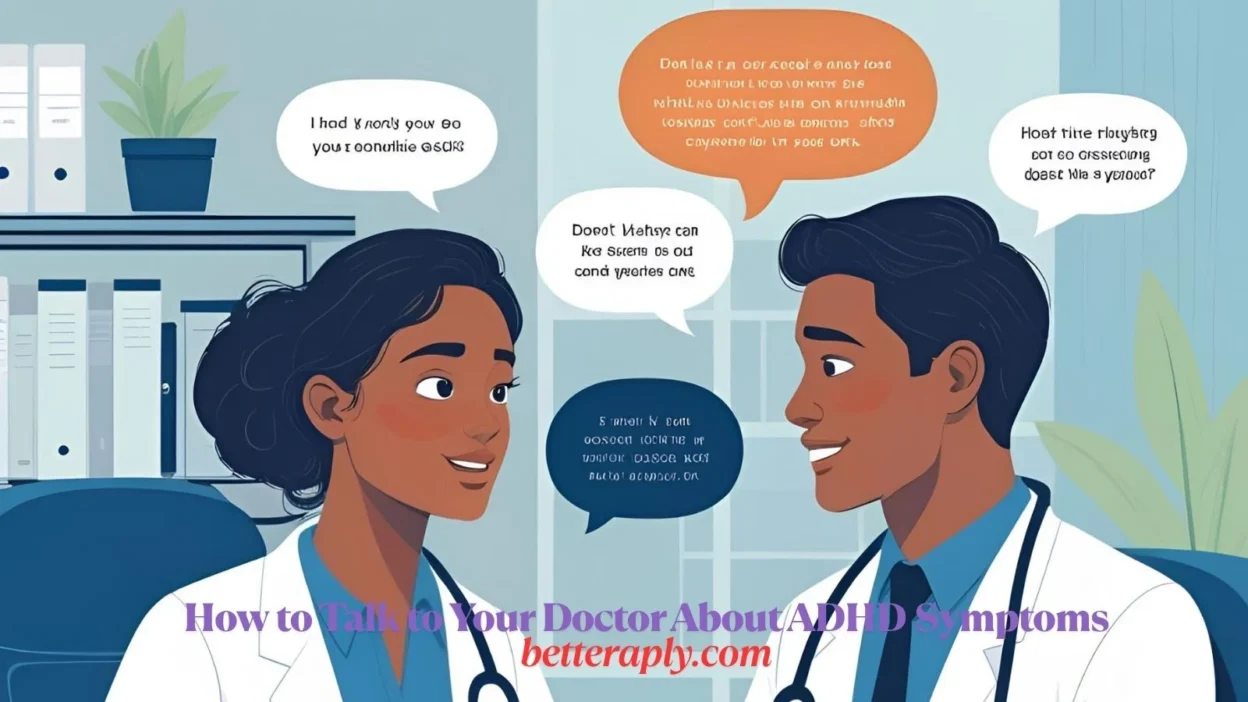Feeling distracted, forgetful, or overwhelmed more than usual? You might be wondering if ADHD could be the reason. Many people struggle with focus and attention, but don’t always know how to bring it up with a doctor. It can feel awkward, confusing, or even embarrassing, especially if you’re an adult. But learning how to talk to your doctor about ADHD symptoms is an important first step to getting the help you need.
This guide will walk you through exactly what to say, what not to say, and how to share your experiences clearly. Whether you’re nervous or unsure where to begin, you’ll find helpful examples, real-life scenarios, and supportive tips that make this conversation easier and more productive.
Sorry Generator
Be Clear About the Struggles You’re Facing

Your doctor needs to understand what daily life looks like for you. Be specific and give real examples.
✅ What to say:
- “I forget appointments and lose things almost every day.”
- “It’s hard for me to stay focused in meetings or finish tasks at work.”
- “I’ve been struggling with focus and time management for years.”
❌ What NOT to say:
- “I just have a short attention span.”
- “Everyone gets distracted, right?”
- “I don’t know, I just feel off.”
Scenario: Instead of saying, “I can’t concentrate,” try, “When I read, I have to re-read the same paragraph five times because I zone out.”
Share How It Affects Your Daily Life
ADHD symptoms usually cause issues at work, school, or home. Make that clear to your doctor.
✅ What to say:
- “My work performance is suffering because I keep missing deadlines.”
- “I get overwhelmed by simple tasks and can’t keep things organized.”
- “I’ve had trouble staying focused since I was a kid.”
❌ What NOT to say:
- “I guess I’m just lazy.”
- “I probably just need more sleep.”
- “Maybe I’m just bad at adulting.”
Scenario: If your symptoms are affecting relationships, say, “I constantly interrupt people or forget important conversations — it’s hurting my friendships.”
Be Honest About Your History
Doctors look at long-term patterns. Mention if you’ve had similar struggles in childhood or previous jobs or schools.
✅ What to say:
- “Even in school, I had trouble sitting still or finishing homework.”
- “My teachers used to say I was smart but unfocused.”
- “This has been a pattern for years, not just recently.”
❌ What NOT to say:
- “This just started yesterday.”
- “I don’t remember anything before last year.”
- “It’s not a big deal.”
Scenario: If you’ve been trying coping strategies, say, “I’ve used planners and reminders, but I still forget key things almost daily.”
Avoid Asking for Specific Medications
Instead of requesting a prescription, focus on describing your symptoms. This builds trust and shows you’re looking for the right solution, not just a quick fix.
✅ What to say:
- “I’d like to understand what’s going on with my focus and attention.”
- “Can we explore testing or options to manage this better?”
- “I’m open to whatever steps are needed, including therapy or assessments.”
❌ What NOT to say:
- “Can you prescribe Adderall right now?”
- “I heard stimulants work, can I get those?”
- “I just need something to help me focus.”
Scenario: If you’re interested in treatment, say, “I’d like to explore what treatment options exist if ADHD is diagnosed.”
Ask About Getting an ADHD Evaluation
Most doctors will want to do a full evaluation or refer you to a specialist. That’s a good thing.
✅ What to say:
- “Can we do an ADHD assessment or screening?”
- “Do you recommend a specialist I could talk to?”
- “What steps do we need to take to confirm a diagnosis?”
❌ What NOT to say:
- “Just give me whatever you think works.”
- “I don’t want to go through a long process.”
- “Can we skip to the medication part?”
Scenario: If you’re unsure, ask, “What’s the best way to get a clear diagnosis and understand what I’m dealing with?”
Final Thoughts
Talking to your doctor about ADHD can feel intimidating, but it’s one of the most important steps you can take for your health. By being honest, specific, and focused on your symptoms, you give your doctor the information they need to help you. Remember, how to talk to your doctor about ADHD symptoms is about clarity, not perfection. You’re allowed to ask questions, express concerns, and take control of your mental health.




